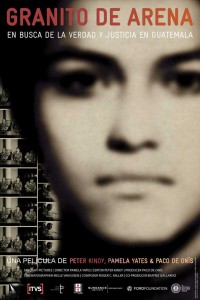Granito de arena
“Ever since I filmed these generals in 1982, I’ve wanted to see them pay for their crimes,” says filmmaker Pamela Yates.
Determined to “find out what was really going on,” Yates originally came to Guatemala in the 1980s to make a documentary about a hidden war. Thirty years later, material from her film, which captures some of the only footage of Guatemala’s 36-year civil war, is being used in an international genocide case against one of its interviewees, military dictator Gen. Efrain Ríos Montt.
Part political thriller, part memoir, Granito de arena is the sequel to Yates’ internationally renowned When the Mountains Tremble. Featuring Yates trawling through boxes of 16mm film searching for forensic evidence for lawyers to use against Ríos Montt and following Nobel Laureate Rigoberta Menchú to Spain as she initiates a court case against the war criminals, Granito is a testament to never giving up.
“For me, Granito is a second chance to help right a terrible wrong,” says Yates. “I was terrified [filming the first documentary]. But I compartmentalized my fear in order to make When the Mountains Tremble. In Granito, since I’m the storyteller, there are shots of me in 1982, and I look pretty scared.”
From the Highlands and cemeteries of Guatemala, to the inner chambers of the Spanish National Court, and to film studios in New York, Granito is a journey of brutality, impunity and hope. It introduces us to undaunted Guatemalans who never gave up on their quest to uncover the truth about their buried past—despite their own government’s attempts to conceal it.
Alongside fearless lawyers, forensic anthropologists and a formidable group of witnesses, the team uncovers an incriminating interview with dictator Ríos Montt and a hidden archive from Guatemala’s National Police, which they hope will bring justice for the families of the 200,000 people who were killed at the hands of the government during the Guatemalan civil war.
“We now know that hidden in that war was a genocide the Guatemalan military dictators committed against the Maya people. The anger I feel towards those generals is almost unbearable.”
“Granito is a concept I first learned in the Guatemalan Highlands and has carried with me throughout my filmmaking life. It reflects the communal values that guide Maya communities and means that each of us can make a small contribution to positive social change, and together we can make great changes in favor of equality and human rights,” says Yates.
The film, which has already won a host
of awards including Best Creative Documentary at the Paris International Human Rights Film Festival, will premier in Guatemala.
The Premier will be held on March 1st at 7:30 pm., on March 2nd, 5:30pm, there will be a second function at the Museum of the University of San Carlos in the Salón Mayor Adolfo López and Salón Mijangos. A cinema-debate will be attended by the filmaker and others from the film. See Datebook listing on page 22.
